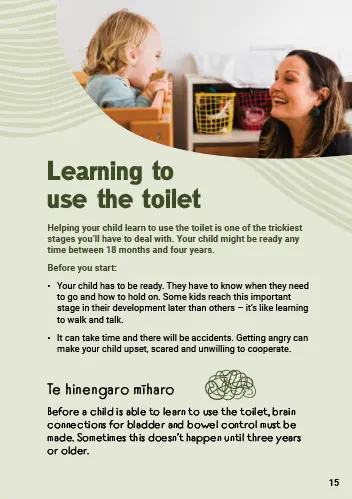
No more nappies?
Some children take longer than others to make progress with toileting. Sometimes, children regress when they've been out of nappies. This may be down to changes in the child's environment.
Some whānau will feel like they’ve been buying or washing nappies forever and wonder if it will ever end!
Try to help them if they’re feeling downcast about their child's progress with toileting.
Remind them that some children will take a lot longer to toilet independently than others. Even though it can be really frustrating, it’s important to remember that getting angry doesn’t help their progress, and may hinder it.
Sometimes problems with bladder or bowel control and bedwetting runs in families.
Pātai atu ki te whānau:
- Are you aware of other whānau members who’ve been late to toilet train?
- What about bedwetting?
Regression
An extra frustration for whānau is when their tamaiti has been out of nappies for months and then suddenly starts to wet or poo themselves again.
Added to their distress is when their child doesn’t even seem that bothered about walking around with wet or smelly pants.
Regression in toileting can be caused by a number of things. It might simply be the child experiencing a growth spurt, which is temporarily disrupting things. Or changes in the whānau might be causing the tamaiti some stress, which could require some sensitive conversation on your part to find out what’s been going on. Checking children’s general health is a good place to start.
Pātai atu ki te whānau:
- Has your tamaiti been to the doctor recently?
- Were they given any medications?
- Were they given anything they haven’t had before?
Changes in routines or environments
Often regression is about change. In the first instance, our brains see anything new as a possible threat, which can cause stress hormones to be released.
What might seem nothing to us adults can be upsetting for a young child. And they may not even be consciously aware of it.
Pātai atu ki te whānau:
- Think about the last few months – is there anything new or different happening at home or within the whānau?
- How about outside of the home and whānau?
- Stress can be the result of a new routine, situation or person in their lives, such as a new baby, a visitor, a new caregiver or early learning centre, a new home or parents returning to work.
Watching and noticing
Encourage whānau to talk through what they’ve noticed and what they think might be going on for their child.
If they can’t seem to put their finger on any changes that might be influencing this regression, they might have to ask others in their child’s lives what they’ve noticed.
Help them to make a plan of who to talk with. Maybe ask their child’s early childhood education teacher, babysitter or other caregivers to see if any changes may have had an impact.
Encourage them to book a check-up with their doctor or health nurse.
For more information, revisit these other articles:












